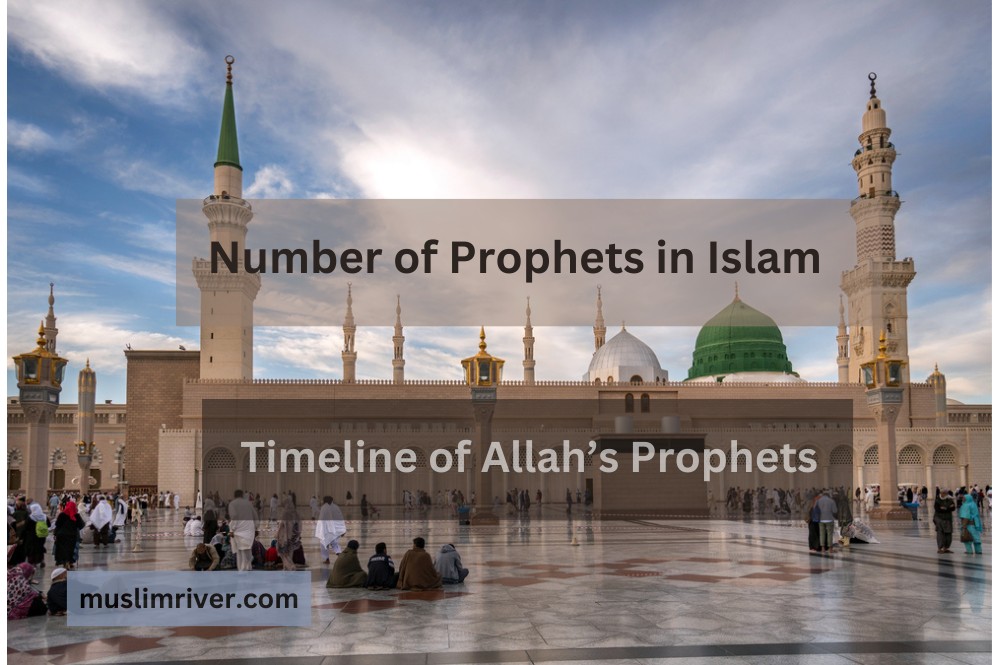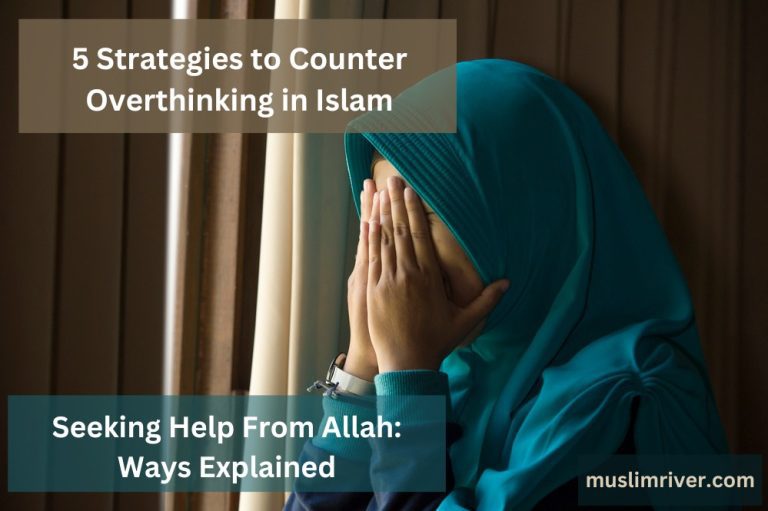How Many Prophets are in Islam? | Timelines of Prophets
Are you curious about how many prophets are included in the Islamic faith? You may want to know more about their roles and importance within Islam.
You might be surprised to learn that 25 Prophets’ names are mentioned explicitly in the Quran, each helping shape and spread the message of Islam.
In this blog post, we’ll explore why these figures hold such an important place in Muslim history and provide insight into what makes them so well-respected throughout much of the Islamic world today.
Names of All Prophets in Islam
The names of all 25 prophets mentioned in Quran are:
- Adam A.S
- Idris A.S
- Nuh (Noah) A.S
- Hud
- Saleh (Methuselah)
- Lut
- Ibrahim
- Ismail
- Ishaq
- Yaqub
- Yusuf
- Shu’aib
- Ayyub
- Dhulkifl
- Musa
- Harun
- Dawud
- Sulayman
- Ilyas
- Alyssa
- Yunus
- Zakariya
- Yahya
- Isa
- Muhammad
To get complete details of the 25 prophets, visit the Wikipedia page here: https://en.wikipedia.org/wiki/Prophets_and_messengers_in_Islam#Known_prophets

Minor Prophets of Islam
The Minor Prophets of Islam are lesser-known, yet they still immensely impacted the Islamic faith. These prophets include Hud, Saleh (Methuselah), Lut, Shu’aib, Dhulkifl, Ilyas, Alyasa, Yunus, Zakariya, and Yahya.
Were Messengers Sent to Every Nation?
Yes, Messengers were sent to every nation according to the Islamic faith. The Quran states that Allah has sent Messengers to all nations:
۞ إِنَّآ أَوْحَيْنَآ إِلَيْكَ كَمَآ أَوْحَيْنَآ إِلَىٰ نُوحٍۢ وَٱلنَّبِيِّـۧنَ مِنۢ بَعْدِهِۦ ۚ وَأَوْحَيْنَآ إِلَىٰٓ إِبْرَٰهِيمَ وَإِسْمَـٰعِيلَ وَإِسْحَـٰقَ وَيَعْقُوبَ وَٱلْأَسْبَاطِ وَعِيسَىٰ وَأَيُّوبَ وَيُونُسَ وَهَـٰرُونَ وَسُلَيْمَـٰنَ ۚ وَءَاتَيْنَا دَاوُۥدَ زَبُورًۭا ١٦٣
[Surah An-Nisa 4:163] Source: https://quran.com/4/163
Indeed, We have sent revelation to you ˹O Prophet˺ as We sent revelation to Noah and the prophets after him. We also sent revelation to Abraham, Ishmael, Isaac, Jacob, and his descendants, ˹as well as˺ Jesus, Job, Jonah, Aaron, and Solomon. And to David We gave the Psalms.
The divine goal of these Messengers was to ensure that knowledge about Islam spread far and wide. This is why the Quran mentions various prophets – so no one would be exempted from having access to learning about this powerful faith.
Number of Prophets Mentioned in the Quran
The Quran mentions a total of 25 prophets, from Adam to Muhammad. The importance and contribution of these prophets to the Islamic faith are immense.
They have helped shape and spread the message of Allah, impacting Muslim life and culture today.
وَإِذْ أَخَذْنَا مِنَ ٱلنَّبِيِّـۧنَ مِيثَـٰقَهُمْ وَمِنكَ وَمِن نُّوحٍۢ وَإِبْرَٰهِيمَ وَمُوسَىٰ وَعِيسَى ٱبْنِ مَرْيَمَ ۖ وَأَخَذْنَا مِنْهُم مِّيثَـٰقًا غَلِيظًۭا
[Al-Ahzab 33:7] Source: https://quran.com/33/7
And ˹remember˺ when We took a covenant from the prophets, as well as from you ˹O Prophet˺, and from Noah, Abraham, Moses, and Jesus, son of Mary. We did take a solemn covenant from ˹all of˺ them
There is another Ayat in Quran which is stated as:
وَلَقَدْ أَرْسَلْنَا رُسُلًۭا مِّن قَبْلِكَ مِنْهُم مَّن قَصَصْنَا عَلَيْكَ وَمِنْهُم مَّن لَّمْ نَقْصُصْ عَلَيْكَ ۗ وَمَا كَانَ لِرَسُولٍ أَن يَأْتِىَ بِـَٔايَةٍ إِلَّا بِإِذْنِ ٱللَّهِ ۚ فَإِذَا جَآءَ أَمْرُ ٱللَّهِ قُضِىَ بِٱلْحَقِّ وَخَسِرَ هُنَالِكَ ٱلْمُبْطِلُونَ
[Ghafir 40:78] Source: https://quran.com/40/78
“Indeed We have sent messengers before you (O Muhammad); of some of them We have related to you their story and of some, We have not related to you their story”
How to Have a Belief in Messengers of Allah?
It is stated in Quran:
وَيَوْمَ نَبْعَثُ مِن كُلِّ أُمَّةٍۢ شَهِيدًۭا ثُمَّ لَا يُؤْذَنُ لِلَّذِينَ كَفَرُوا۟ وَلَا هُمْ يُسْتَعْتَبُونَ ٨٤
˹[Al-Nahal 16:84] Source: https://quran.com/16/84
Consider, O Prophet,˺ the Day We will call ˹a prophet as˺ a witness from every faith community. Then the disbelievers will neither be allowed to plead nor appease ˹their Lord˺.
Comprehending the fundamentals of faith is integral to maintaining a sound and dependable conviction in Allah’s (SWT) messengers. Islamic tradition teaches that belief should result from knowledge; once one learns something, one can accept it without reservation.
Understanding Allah’s envoys is essential to fostering a robust faith in them. While the exact number of prophets sent by Allah (SWT) may remain unknown, it should not diminish their importance and relevance to our lives.
To bolster our faith, we must investigate the stories of Allah’s messengers and recognize what their lives can teach us. A deeper look into their examples and lessons reveals wisdom essential to incorporate into our lives; additionally, it allows us to model patience, mercy, humility and justice – attributes they were known for – in all aspects of life.
Timeline of the Islamic Prophets
The timeline of the prophets and messengers sent by Allah (SWT) is incredibly vast, from Adam to Muhammad, Islam’s last Messenger. Here we will take a look at some of these important figures in Islamic tradition:
Adam
Adam was the first Prophet created by Allah (SWT). He taught his children about faith and the oneness of God (tawhid).
Noah
Noah was a prophet sent to call people back to the worship of Allah. He built an ark that carried his family and believers away from the flooded earth.
Abraham
Many Muslims consider Abraham, the founder of monotheism or tawhid. Some believe him to be the first Muslim.
Musa
Musa was sent as a messenger of Allah to free his people from slavery in Egypt. He received the Ten Commandments (al-A’araf 7:145-154) and taught them about tawhid.
Issa A.S
Allah sent Issa A.S. to guide his people toward justice and peace. He taught about monotheism and delivered many miracles as proof of his truthfulness.
Muhammad (PBUH)
Muslims regard Muhammad (PBUH) as the last Messenger sent by Allah. He proclaimed Islam’s ultimate message of trusting in tawhid while upholding justice, mercy, and equality.
We may not know exactly how many prophets have been dispatched from Allah (SWT), yet it is vital to recollect that each Prophet carries meaningfulness into our lives.
Engaging in their narratives and teachings can gain invaluable knowledge regarding faith, justice, and mercy necessary to lead a true Islamic life.
Remarkably enough, though, it is vital to remember that even if the exact amount of prophets Allah sent hasn’t been revealed yet- they are all equally significant figures who deserve veneration.
Let us honor these messengers by adhering to their teachings and striving to be devoted Muslims. May Allah (SWT) bestow us with knowledge and insight. Amen!
FAQs
Who are the Great Prophets?
As the Quran mentions, four great prophets are Ibrahim, Musa, Jesus and Muhammad (peace be upon them all). Their remarkable tales can be found within its sacred pages.
Who is the Favourite Prophet Of Allah?
Allah (SWT) loves His prophets equally, so we must demonstrate our respect for all of them. Let us pick out the admirable qualities from each Prophet to apply in our lives, and may Allah (SWT) guide us on this journey. Ameen!
Conclusion
Understanding the lives of Allah’s messengers is essential for cultivating strong faith in them. Additionally, we can develop our confidence further by studying their stories and reflecting on what lessons they carry for us today.
We as Muslims must not forget that despite the unknown number of prophets dispatched by Allah (SWT), everyone is equally important and deserves our utmost respect.
We can honor these sacred messengers by adhering to their teachings and putting effort into becoming better Muslims daily. Furthermore, we must strive to embody the qualities of mercy, patience, humility, and justice in all aspects of our existence. May Allah (SWT) guide us on this path. Amen!







I am impressed with this website, very I am a fan.
Thanks, I have recently beeen looking for information abolut this topic for a long time and yours is the best I’ve cme upon so far.
However, what concerning the bottom line?
Are you sure abhout the source?